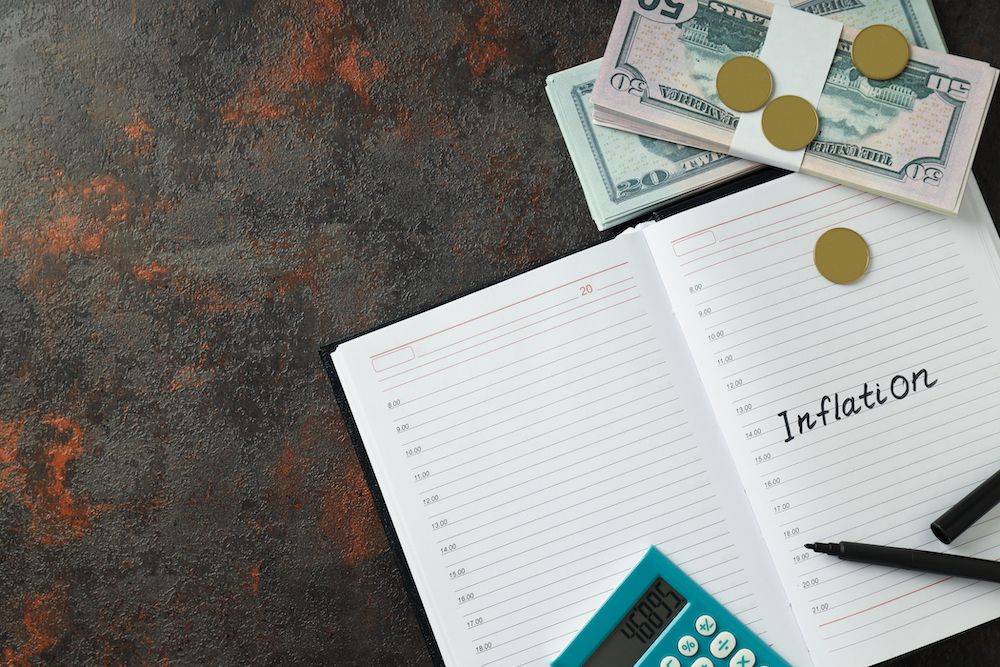Econ 101: Understanding the basics, from inflation to recession
Have you ever wondered why prices go up, or why the economy hits a rough patch? With talks of a looming recession, record-high inflation, and so much more, you’re also probably wondering how these forces impact your personal finances.
Financial literacy is the cornerstone of good financial health, and Origin is here to help you learn more about economic terminology so you can feel more confident managing your personal finances. With an overview of economic essentials and a few helpful tips for navigating personal finance in times of uncertainty, read on to learn more.

What is inflation?
Simply put, inflation is the general increase in prices over time. This means the purchasing power of your money decreases, and it takes more money to buy the same goods and services.
Here’s an example. You go into your favorite coffee shop and order your usual iced latte. A few months ago, it only cost you $4, but now it's $4.50. Those extra 50 cents are a result of inflation. Some prices slowly increase bit by bit and others skyrocket immediately, but either way, inflation means your money may not stretch as far as it used to.
What causes inflation?
It’s a complicated issue, but one of the main drivers is an increase in the money supply. When there's more money circulating in the economy, people have more cash to burn. This leads to higher demand for goods and services. But as demand increases, businesses can charge higher prices, and thus, inflation occurs. In simple terms, there’s too much money chasing too few goods.
Inflation can also occur when the cost of production increases, making goods more expensive on both ends. It can be triggered by factors such as rising wages, increased raw material costs, or changes in government regulations. When businesses face higher costs, they often try to recover those expenses by raising prices for their products or services. As a result, consumers have to spend more money to purchase the same goods or access services, sustaining the inflation cycle.
Inflation can have both positive and negative effects on the economy. On one hand, a mild and controlled level of inflation encourages spending and investment, incentivizing individuals and businesses to put their money to work rather than hoarding it.
However, in many cases, inflation gets out of control and has detrimental effects. High inflation undermines people’s purchasing power while also eroding the value of savings. This makes it harder for people to plan for the future and maintain their standard of living, creating uncertainty. And as prices become unpredictable, businesses also have trouble making long-term decisions.

What is a recession?
A recession is a widespread decline in economic activity. During this period of prolonged downturn, the economy shrinks, businesses struggle, and unemployment rates rise.
Common signs of a recession include increased layoffs and job losses, difficulty finding employment, and scaled-back operations. This leads to reduced income, creating financial instability and impacting people’s daily lives as well as the economy. This, in turn, leads to decreased spending and an overall economic slowdown.
What causes a recession?
In addition to a decrease in consumer spending, a decrease in business investment and tightening credit conditions can also lead to a downturn. A decline in international trade or the burst of an asset bubble, like the housing market collapse of 2008, can also contribute. Additionally, external factors such as natural disasters, global political conflicts, and pandemics can also shock the economic system, just as the COVID-19 pandemic has in recent years.
While recessions mostly cause immediate negative changes in the economy, there are a few upsides in the long run. In some cases, a recession can act as a corrective force, eliminating inefficient businesses, bursting speculative bubbles, and promoting healthier economic practices moving forward. Recessions also push policymakers to rethink economic policies, leading to stabilizing reforms and stronger financial regulations. However, these benefits are usually realized in the long term, rarely off-setting the immediate hardships individuals and businesses face during the downturn.
So how do we get out of a recession?
Recovering after a recession requires all hands on deck. From governments implementing fiscal policies to central banks encouraging liquidity and lending, all of the large players and financial institutions must get involved to stimulate the economy. However, it’s not just about the big dogs – individuals also help to drive economic growth and speed up recovery. And at the end of the day, collaboration and policy implementation are the keys to re-stabilizing the economy after a recession.

How do these things affect you and your personal finances?
You know that inflation and recession impact the economy as a whole. But how do they impact your everyday life and personal finances?
Inflation
When there is inflation, the general price of goods and services increases over time. This can impact personal finances in several ways such as:
1. Reduced Purchasing Power: As prices climb, a fixed amount of money buys fewer goods and services. This means your savings and income may not stretch as far, affecting your ability to afford certain items or achieve your financial goals.
2. Increased Borrowing Costs: Inflation often leads to higher interest rates. If you have loans or mortgages with variable interest rates, borrowing costs may rise, increasing your monthly payments and straining your budget. But by using Origin’s personal financial management tool, you can track your spending without the hassle and make your budget work for you.
3. Smaller Investment Returns: Inflation can erode the real value of your investment returns, causing purchasing power to diminish over time. That’s why customers need to consider investments that offer a hedge against inflation, such as stocks, real estate, or inflation-protected securities. Read up on creating a future-proof retirement plan with diverse assets for more info on how Origin Bank can help.
Recession
When there is a recession, you’ll notice a reduction in economic activity that can extend to your personal finances. This can impact your wallet in many ways like:
1. Job Losses and Income Reduction: In the midst of a recession, layoffs and unemployment rates rise. Even if you don’t lose your job, you may experience reduced work hours and a deflated income, straining your ability to pay down debt, pay off your mortgage, and more. To help ensure your savings aren’t negatively impacted, avoid these common financial mistakes to help recession-proof your finances.
2. Declining Asset Values: Economic downturns can decrease the value of assets like homes or investments. If you own properties or have investment portfolios, you may experience a decrease in net worth that can affect your overall financial stability and long-term plans.
3. Reduced Credit Availability: When recession strikes, financial institutions usually have to tighten their lending criteria. This makes it harder for customers to obtain loans or credit. And when credit is hard to come by, it’s harder for you to make major purchases, finance your home, or embark on business ventures. But if you choose a community bank like Origin for your small business and personal loans, you can expect one-on-one assistance and personalized service no matter the circumstances.
Financial solutions that prepare you for anything
From inflation to recession, understanding the basics is crucial for navigating the ever-changing economy and your role in it. Scroll through our website for more financial literacy resources, from educational articles to personalized guidance.
But when it comes to your personal finances, you don’t have to go it alone. At Origin Bank, we’re proud to offer tools that make it easy to manage your finances, like our budget-tracking Personal Financial Management tool. Take the next step towards financial confidence and schedule a consultation with our Trusted Advisors today.